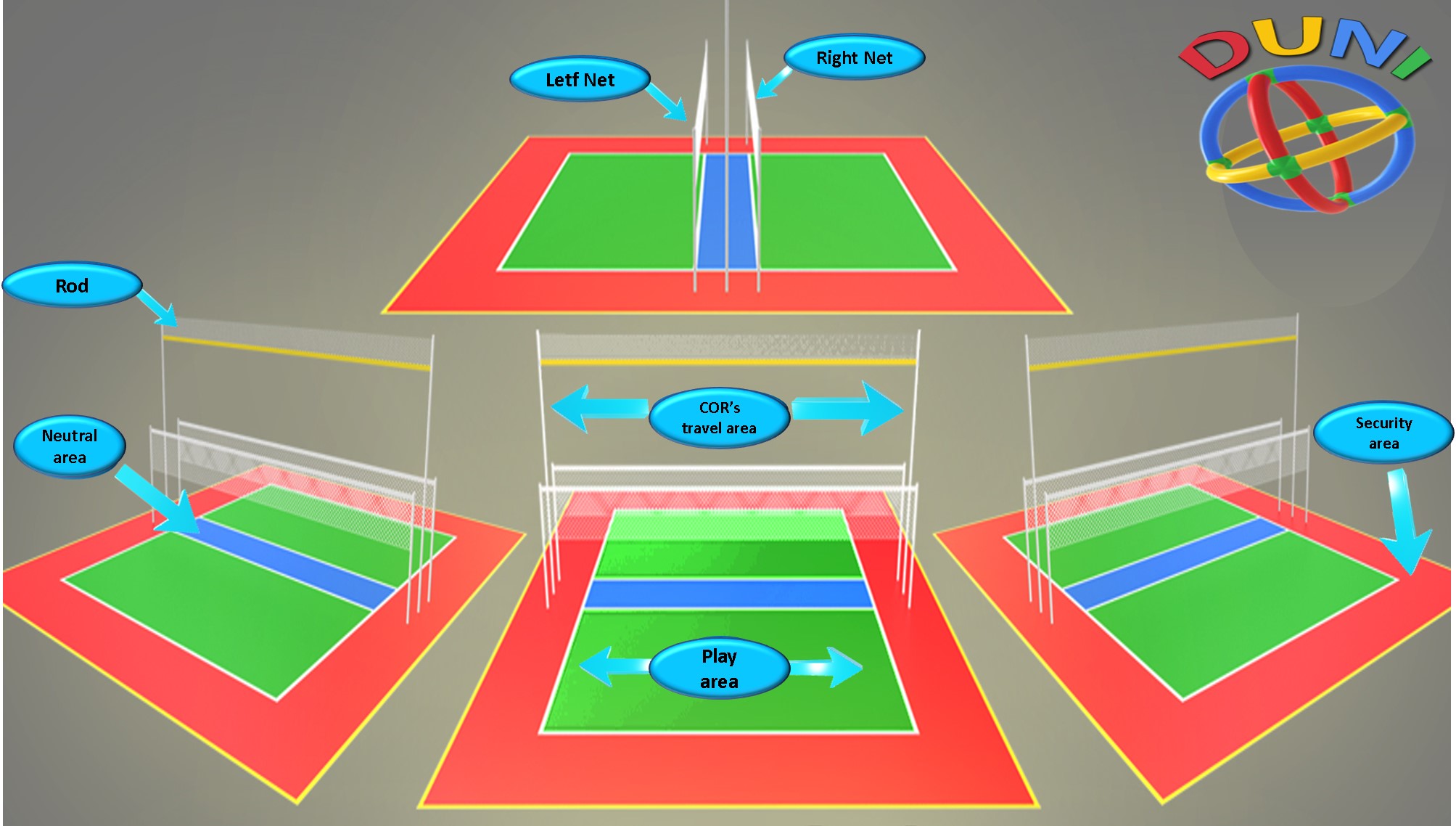CHAPTER 11
THE REFEREE
1.- THE PERSON OF THE REFEREE: In each match, a referee must act who, during the match, will referee from outside the field, sitting or standing, preferably on a raised platform. The referee, a natural person, is the only "judge" in the game and his decisions will never be discussed or ignored.
2.- RE-ENTRY OF PLAYERS: One or more players may leave the field of play at any time and may only re-enter the field with the consent of the referee. Letting him enter is the obligation of the referee, when the game is momentarily stopped. However, the player's area must not be left empty.
3.- SUSPENSION OF THE MATCH: A referee may definitively suspend a match if he deems that, in his opinion, it is appropriate to do so. The following facts are grounds for this suspension: disorder, violence, illegal play, player disobedience, public misbehavior, failures in the facilities, bad weather, etc.
4.- DRAW OF THE SIDE: Before the game and in front of the captains of both teams, the referee, if necessary, will raffle the choice of the field of play with a coin. The winning team chooses a side. The losing team gets kick-off.
5.- TIMING OF THE MATCH: In order that the referee does not have to add time lost to the duration of the match, the referee must stop his stopwatch when any of the following situations occur: injured dunista, ball that breaks, net that falls, time requested by the coach, etc, etc. Therefore, the referee will not be able to prolong the duration of the match to compensate for the stoppages of the game that have occurred. The duration of the match will always be the one indicated by the referee's stopwatch.
6.- THE MISSION OF THE REFEREE: It is the mission of the referee to demand, before the start of the match, that the weigh-in of the players and the Cor has been completed, with the height of the nets and the rod, with adequate lighting, with the regulatory security area, with the precise and visible delimitation of areas, etc. Therefore, the referee will not start the match until his demands have been met satisfactorily.
7.-CHARACTERISTICS OF THE DECISIONS: The arbitrator's decisions regarding matters of fact, time or others, cannot be appealed, even in case of error. Once his ruling has been made, the arbitrator will not revert to that decision. An arbitrator must always be a person experienced in DUNI and excellently prepared, in order not to make any mistakes in his arbitration.
8.- ELEMENTS OF THE REFEREE: The referee must be provided with a whistle, a megaphone (or audio equipment, if possible), a note book, a pencil and a stopwatch. The referee will start his stopwatch at the start of the game and will stop it just at the time the duration of the game is completed. In addition, he will stop it when the game has been stopped for any of the various reasons already mentioned.
9.- POWERS OF THE ARBITRATOR: The referee, signaling fouls with his whistle, should try to ensure that the Cor never stops during the DUNI match. The referee will blow his whistle, a certain number of times, in the following cases:
a.- Only once: to indicate a foul that will be sanctioned with 1 (one) point, but the game must continue without stopping.
a.- Only once: to indicate a foul that will be sanctioned with 1 (one) point, but the game must continue without stopping.
10.- ASSISTANT REFEREE: If the circumstances allow and require it, the referee will be advised by an assistant referee. The assistant will not use a whistle and will stand in front of the referee, on the other side of the court. In such a case the assistant may also time.
11.- POSSIBLE CHANGE OF THE COR: At any time during the game, the referee may change the Cor for another of greater or lesser weight, at his discretion, and so that the weight of the new Cor is consistent, both with the ability of the players and with the nature of the game. .
12.- FUNDAMENTAL PRINCIPLE: It is a fundamental principle that, during play, the ball does not stop when the referee signals a foul. The idea is to always maintain the dynamism of the game. The COR, as much as possible, should always be in motion.
13.- POINT OUT FAULTS: Each time a player commits a foul, the referee will only blow his whistle once, to indicate the foul, but play will not stop.
14.- STOP THE COR: Only when the ball has fallen to the ground, or has been stopped, the referee will stop the game by blowing his whistle twice in a row.
15.- THE COACH: Every team, apart from the player who is their captain, must report to their coach. Before the match, the referee will be introduced to the coaches of the two teams, since it will be with them, exclusively, that the referee will resolve all matters related to the match. Every team will communicate with the referee exclusively through their coach.

